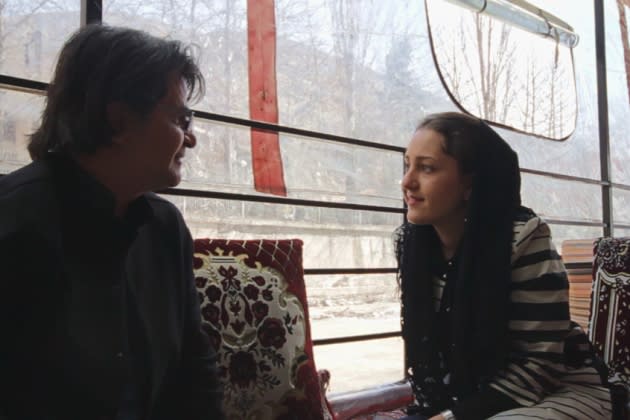Sreemoyee Singh’s Seven Year Journey to Making Berlinale Documentary ‘And, Towards Happy Alleys’ With Iran’s Jafar Panahi
- Oops!Something went wrong.Please try again later.

For Indian filmmaker Sreemoyee Singh, world premiering her Iran documentary “And, Towards Happy Alleys” at the Berlin Film Festival’s Panorama strand is the culmination of a journey that began in 2015.
Singh completed a masters degree in film studies at Jadavpur University, Kolkata, India and went on to pursue a PhD on The Exiled Filmmaker in Post Revolution Iranian Cinema, with the objective of understanding the source of “impossible hope” in Iranian films. The filmmaker was also introduced to the poetry of Iran’s Forogh Farrokhzad during the course and “connected deeply” to her verses. A desire to read Farrokhzad’s verses in the original Persian led Singh to learn Farsi.
More from Variety
German Series Projects Impress With Timely Subject Matter: Murder, Intrigue, Scandal, Mystery
Beta Film's Crime Drama Series 'The Silence' Heads to Ukraine for Season 2 (EXCLUSIVE)
In December 2015, Singh travelled to Tehran for the first time as part of her work on the PhD and with the idea of making a documentary from her field research and experiences and enrolled in advanced Farsi-language classes. Funding for the film came from a brace of fellowships and Singh financed the rest of the documentary herself. During the course of her research, during which she travelled to Iran several times until 2019, staying three months each time, Singh got unprecedented access to some of the stalwarts of Iranian cinema including Jafar Panahi, Aida Mohammadkhani and Farhad Kheradmand and human rights activist Nasrin Soutodeh.
Singh is from a family of musicians. Her ability to learn and sing Farsi songs also endeared Singh to the people she met in Iran, given that women are banned from singing solo in the country.
“The people I met in Iran did not look at me as just another outsider – but as someone who had studied their histories and made efforts to speak their language to connect with them. Also being an Indian helped considerably,” Singh told Variety. “That I was not someone who was very different – in looks, or language, or shared history of culture and poetry – or having lived in a country like India where we’ve had our own struggles finding our voices – really helped people in Iran connect with me.”
When Singh met Panahi, the filmmaker was already proscribed from making films for 20 years by the Iranian regime, a ban that he has defied regularly.
“When I first met Panahi, I wasn’t prepared to see such a cheerful person. I expected someone who was affected by the constant brutalities of the regime. His mood resembled a patch of cheery morning sunlight on a glum day. He derived a lot of joy from our interaction and went out of his way in his hospitality. He became like a true guide. Through the windows of his car my camera found a lens to look at the world outside. He was banned from officially making films since 2009 yet instinctively he found ways to direct the reality outside towards my camera,” Singh said.
Panahi was arrested again in 2022 in the wake of Iran’s conservative government crackdown and released earlier this month. Singh, who was deeply impacted by the news of his re-arrest, stayed in touch with Panahi’s son to get news of the filmmaker. She was also in contact with Soutodeh, one of the leading voices in the ongoing women’s rights movement in Iran, who has also been arrested several times.
Being selected at Berlin is a “dream come true” for Singh and her executive producers Hussain Currimbhoy and Noopur Sinha as it is a festival that has constantly supported Iranian cinema. Panahi and his often-incarcerated compatriot Mohammad Rasoulof have both won Golden Bears.
Currimbhoy, who is also a co-founder of the Programmers of Color Collective initiative, told Variety: “We absolutely need to hear from intelligent, young documentary directors, especially those who work independently and who create stories like this outside the Western system.”
Sinha added: “We are determined to be a strong voice in support of the movement in Iran, and if this film can be a look inside a world that’s deliberately being censored, and can be an impetus for support globally that leads to real change, it is truly what we would have set out to do with our film.”
Meanwhile, Singh lives in hope that the situation in Iran improves. “The news every day is dire but there is a lot of hope. We can’t live without hope,” Singh said: “Panahi had said himself, ‘Hope keeps us alive.'”
Best of Variety
Sign up for Variety’s Newsletter. For the latest news, follow us on Facebook, Twitter, and Instagram.
